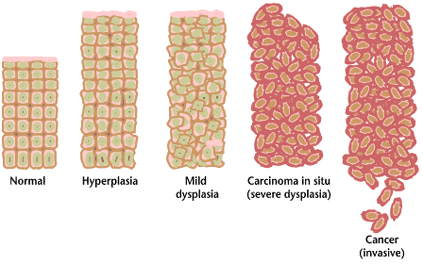
Cervical cancer: identifying factors that cause cells to become cancer
January 18, 2016January is Cervical Cancer Awareness month. Vaccination to prevent human papilloma virus (HPV) infection in both women and men has led to a decrease in the development and incidence of cervical cancer in women, as well as oral, anal, vaginal, and penile cancers. Cervical cancer, however, still remains the number three cancer related killer of women worldwide.
The development of cervical cancer is linked to persistent, chronic infection with HPV, in particular HPV strains 16 and 18. At the cellular level, it is clear that upon infection, the HPV genes (E6 and E7) work to suppress the anti-tumor functions of the host/human proteins Rb and p53. Chronic infection with HPV (most of the HPV infections that occur are cleared from the body pretty quickly) can lead to the development of precancerous cells and even cancer itself.The cervical cancer vaccine protects against HPV strains 16 and 18 and is recommended for both boys and girls.
While the relationship between HPV infection to cancer development has been largely established, the key steps involved in the transition from normal to cervical cancer remains unknown. Recent papers have looked at some key regulators of gene expression including (among many others) proteins (transcription factors) and microRNAs such as the estrogen receptor alpha , microRNA-34a, lncRNAs, and a protein called programmed cell death 6 (PDCD6). The list of genes, proteins, and other gene regulating effectors that could be involved in cancer development or progression is long. Although it will take time to sort out the key factors, it is beneficial to understand what drives cancer development and progression so that new treatments, prevention strategies, and/or lifestyle changes can be developed to mitigate the disease.
Photo was retrieved from “Cancer progression from NIH”. Licensed under Public Domain via Commons – https://commons.wikimedia.org/wiki/File:Cancer_progression_from_NIH.png#/media/File:Cancer_progression_from_NIH.png